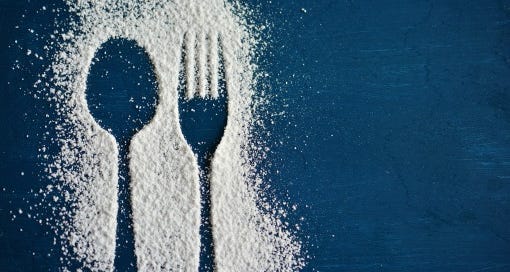The Sweet Deception of Splenda
Since the discovery of saccharin in 1879, artificial sweeteners have played a major role in America’s diet. This is especially so in recent decades, as traditional sugar has gained a reputation for devastating health consequences.
Currently there are six artificial sweeteners approved in the United States: Saccharin, aspartame, acesulfame potassium (Ace-K), sucralose, neotame, and advantame. Of these, Sucralose (sold as Splenda), is the biggest brand and is said to be good for everything from losing weight to helping diabetics stay healthy. If you love sugar but hate the side effects, these sweeteners look to be the perfect dietary additive.
But like all things in life, if it sounds too good to be true, it is. The bitter truth is that artificial sweeteners may actually be more dangerous to human health than anticipated, and worse, we’ve been deceived from the beginning.
A Sporadic History
Like most sugar substitutes, Splenda is a synthetic chemical discovered in 1976 by British scientists seeking a new pesticide formula. Manufacturers marketed it as the “safest” of the low-calorie sweetener lineup, a campaign that has now accounted for roughly 138 million US consumers using the chemical.
Since Splenda is found in about 4000 food products, many are unaware they’re consuming it. For those with a sweet tooth, the idea of eating anything in sight and not gaining weight sounded perfect… a little too perfect. But now, the bitter truth has surfaced: The sweet taste of Sucralose has devastating consequences for the body. There have been questions of safety – of cancer in lab animals, numerous illnesses and weight gain.
Lack of Study Oversight
The EU's Scientific Committee on Food (SCF), the World Health Organization and the U.S. Food and Drug Administration agree that over 110 safety studies over a 20-year period confirm the safety of sucralose. (Sucralose, FDA Final Rule).
Despite these approvals, consumer concern remains high about long-term dosage safety. Other artificial sweeteners such as saccharin, cyclamates, and aspartame were also previously granted FDA approval, only to later be implicated as having carcinogenic, toxic, or minor side effects.
The FDA approved Splenda in 1998 even though some pre-approval studies which were tossed out, showed adverse effects ranging from liver and kidney damage, intense skin reactions, thymus gland and immune impairment. Despite these detrimental health effects and with only six short human trials, Splenda was approved for human consumption. (New Scientist, 1991)
Since then, an analysis of Medline revealed many independent studies continued reporting ongoing health problems with Splenda. The journal Nature revealed artificial sweeteners to be harmful to gut microbes—in turn creating auto-immune problems ranging from depression and arthritis to the regulation of the immune system.
The Canadian Society of Intestinal Research says scientists believe the smoking gun in the cause of a global increase of Irritable Bowel Syndrome (IBS), including both ulcerative colitis and Crohn's disease, may be sucralose. Canada once had one of the lowest rates of IBS in the world, but has attained the highest levels after being the first country worldwide to approve sucralose in thousands of consumer products in 1991.
And while touted to be safe for diabetics, a 2013 Journal of Toxicology and Environmental Health report states that ingested Splenda may even destabilize blood sugar and cause obesity.
Further analysis shows decreases in red blood cell counts, enlarged or calcified kidneys, brain tumors, leukemia, lymphoma and higher mortality rates, indicating that sucralose is not a biologically inert compound.
The FDA is content to criticize current studies showing negative outcomes based on animal, rather than human studies. But they try to have it both ways as industry animal research leading up to FDA approval was considered valid.
Why Is Sucralose So Dangerous?
“The country's entire supply of sucralose is produced in one well-guarded and famously secretive facility in Alabama, where truckloads of common table sugar are shipped in weekly, to be modified via a complex chemical process combining three atoms of chlorine to a sugar molecule”. (Discover Magazine) At that point, the finished product becomes a chlorocarbon, in the family of Chlorodane, Lindane and DDT, says James Bowen, M.D., a physician, biochemist, and survivor of aspartame poisoning.
He states: "It is logical to ask why table salt, which also contains chlorine, is safe while Splenda/sucralose is toxic? Because salt isn't a chlorocarbon. When molecular chemistry binds sodium to chlorine to make salt, carbon isn't included.
Splenda manufacturers use every verbal contortion possible to make Splenda palatable, purposefully steering consumers from the fact that sucralose and salt are as different as oil and water, with the former being highly toxic. Bowen states:
"Splenda/sucralose is simply chlorinated sugar; a chlorocarbon… "Unlike sodium chloride, chlorocarbons are never nutritionally compatible with our metabolic processes and are wholly incompatible with normal human metabolic functioning.”
Since a chlorocarbon is toxic, it’s important to know how much of it is absorbed into the body.
The FDA's "Final Rule" report states that only 11 to 27 percent of the substance is absorbed by the body, while experts at the Japanese Food Sanitation Council argue as much as 40% of ingested sucralose is absorbed. This is an exceptionally large amount, especially when dealing with a potential human health risk.
Go Natural
Eight out of ten Americans now consume some sort of artificial sweetener with many believing it will help them lose weight. But epidemiologic data suggests low calorie sweeteners act as a trigger to activate the brain's pleasure pathway, while lacking the mechanism to deactivate it since the calories never arrive. This results in increased appetite and a variety of metabolic dysfunctions promoting fat storage and weight gain. (2010 Yale Journal of Biology and Medicine review)
Given the evidence, we should assume a “guilty until proven innocent” stance with these Franken-chemicals. Stick with nutritionally complex sweets such as fruits, dates, figs, raisins, coconut sugar or Grade B maple syrup to remain healthy.





